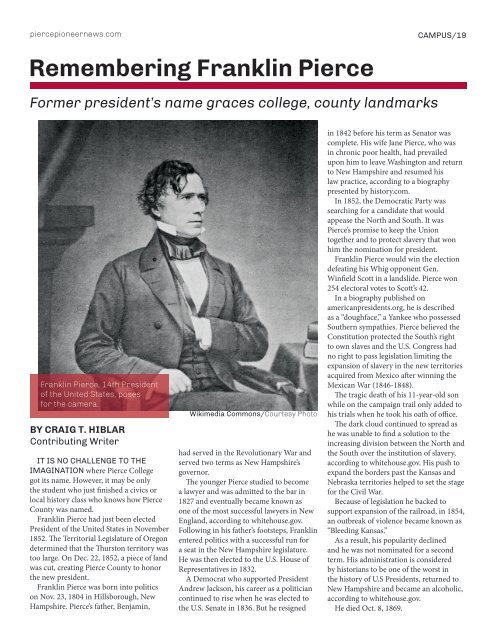The Pioneer Volume 51, Issue 2
The Pioneer, Pierce College Steilacoom's student publication.
The Pioneer, Pierce College Steilacoom's student publication.
Create successful ePaper yourself
Turn your PDF publications into a flip-book with our unique Google optimized e-Paper software.
piercepioneernews.com<br />
CAMPUS/19<br />
Remembering Franklin Pierce<br />
Former president’s name graces college, county landmarks<br />
Franklin Pierce, 14th President<br />
of the United States, poses<br />
for the camera.<br />
BY CRAIG T. HIBLAR<br />
Contributing Writer<br />
IT IS NO CHALLENGE TO THE<br />
IMAGINATION where Pierce College<br />
got its name. However, it may be only<br />
the student who just finished a civics or<br />
local history class who knows how Pierce<br />
County was named.<br />
Franklin Pierce had just been elected<br />
President of the United States in November<br />
1852. <strong>The</strong> Territorial Legislature of Oregon<br />
determined that the Thurston territory was<br />
too large. On Dec. 22, 1852, a piece of land<br />
was cut, creating Pierce County to honor<br />
the new president.<br />
Franklin Pierce was born into politics<br />
on Nov. 23, 1804 in Hillsborough, New<br />
Hampshire. Pierce’s father, Benjamin,<br />
Wikimedia Commons/Courtesy Photo<br />
had served in the Revolutionary War and<br />
served two terms as New Hampshire’s<br />
governor.<br />
<strong>The</strong> younger Pierce studied to become<br />
a lawyer and was admitted to the bar in<br />
1827 and eventually became known as<br />
one of the most successful lawyers in New<br />
England, according to whitehouse.gov.<br />
Following in his father’s footsteps, Franklin<br />
entered politics with a successful run for<br />
a seat in the New Hampshire legislature.<br />
He was then elected to the U.S. House of<br />
Representatives in 1832.<br />
A Democrat who supported President<br />
Andrew Jackson, his career as a politician<br />
continued to rise when he was elected to<br />
the U.S. Senate in 1836. But he resigned<br />
in 1842 before his term as Senator was<br />
complete. His wife Jane Pierce, who was<br />
in chronic poor health, had prevailed<br />
upon him to leave Washington and return<br />
to New Hampshire and resumed his<br />
law practice, according to a biography<br />
presented by history.com.<br />
In 1852, the Democratic Party was<br />
searching for a candidate that would<br />
appease the North and South. It was<br />
Pierce’s promise to keep the Union<br />
together and to protect slavery that won<br />
him the nomination for president.<br />
Franklin Pierce would win the election<br />
defeating his Whig opponent Gen.<br />
Winfield Scott in a landslide. Pierce won<br />
254 electoral votes to Scott’s 42.<br />
In a biography published on<br />
americanpresidents.org, he is described<br />
as a “doughface,” a Yankee who possessed<br />
Southern sympathies. Pierce believed the<br />
Constitution protected the South’s right<br />
to own slaves and the U.S. Congress had<br />
no right to pass legislation limiting the<br />
expansion of slavery in the new territories<br />
acquired from Mexico after winning the<br />
Mexican War (1846-1848).<br />
<strong>The</strong> tragic death of his 11-year-old son<br />
while on the campaign trail only added to<br />
his trials when he took his oath of office.<br />
<strong>The</strong> dark cloud continued to spread as<br />
he was unable to find a solution to the<br />
increasing division between the North and<br />
the South over the institution of slavery,<br />
according to whitehouse.gov. His push to<br />
expand the borders past the Kansas and<br />
Nebraska territories helped to set the stage<br />
for the Civil War.<br />
Because of legislation he backed to<br />
support expansion of the railroad, in 1854,<br />
an outbreak of violence became known as<br />
“Bleeding Kansas.”<br />
As a result, his popularity declined<br />
and he was not nominated for a second<br />
term. His administration is considered<br />
by historians to be one of the worst in<br />
the history of U.S Presidents, returned to<br />
New Hampshire and became an alcoholic,<br />
according to whitehouse.gov.<br />
He died Oct. 8, 1869.


















